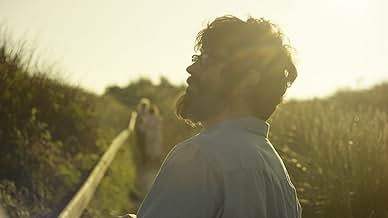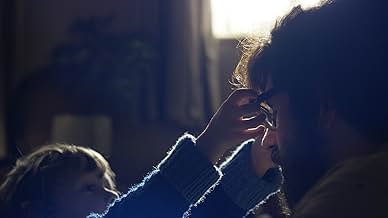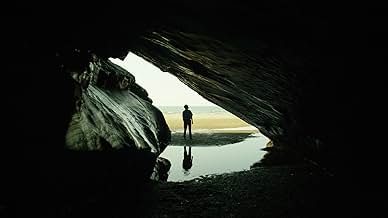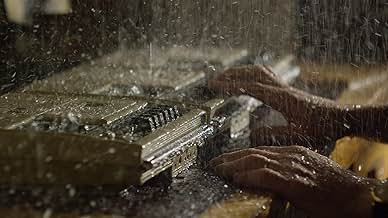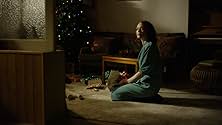Notes on Blindness
- 2016
- 1h 30min
CALIFICACIÓN DE IMDb
7.0/10
2.2 k
TU CALIFICACIÓN
En el verano de 1983, días antes del nacimiento de su hijo, el teólogo John Hull se queda ciego.En el verano de 1983, días antes del nacimiento de su hijo, el teólogo John Hull se queda ciego.En el verano de 1983, días antes del nacimiento de su hijo, el teólogo John Hull se queda ciego.
- Dirección
- Guionistas
- Elenco
- Nominada a3premios BAFTA
- 4 premios ganados y 15 nominaciones en total
John M. Hull
- Self
- (voz)
Marilyn Hull
- Self
- (voz)
Dan Renton Skinner
- John Hull
- (as Dan Skinner)
Sidney Warbrick
- Thomas
- (as Sidney Nicholas Warbrick)
Stanley Warbrick
- Thomas
- (as Stanley John Warbrick)
- Dirección
- Guionistas
- Todo el elenco y el equipo
- Producción, taquilla y más en IMDbPro
Opiniones destacadas
The premise behind this is quite intriguing and so going into it I was really curious about how the whole thing would be executed. It's a documentary and drama film at the same time. It reminded me a lot of The Diving Bell and the Butterfly. There's something quite lyrical and poetic about the filmmaking. The cinematography needed to really capture the kinds of images that could be going around this man's head and through the recorded audio it is able to effectively capture that. I think a problem I had with the film is that I never fully connected with it. I was only able to admire it from a distance because of that disconnect, and because of that I am able to recommend it and say that it is worth the effort. However, it is unfortunate that I wasn't able to like it more.
I love the concept behind these. Using actual tapes, editing them together in a way to present them as a narrative, and then creating the visuals to match it. The fact that it is a story about a man who no longer can see, adds to it. It's an interesting way to mix truth and fiction, because the story and dialogue is all real, and could have been presented as a documentary of sorts. But by editing them, adding the environmental sounds, and getting actors to "play it out", it blurs the line in a really interesting way. That, in addition to some of the insights into how it is to become blind, are the clear highlights of the movie. Sadly, it does not have much more to offer that's very interesting.
In a way, ironically, I think this story would work better as just the audio. The editing done was brilliant, and combine with the atmospheric sounds added, I think it could have been a really good radio story. With an added level that a story about blindness would have no visuals.
In a way, ironically, I think this story would work better as just the audio. The editing done was brilliant, and combine with the atmospheric sounds added, I think it could have been a really good radio story. With an added level that a story about blindness would have no visuals.
This is such an amazing piece of work; put in the shoes of someone who loses his sight, halfway through his lifetime, which is one of my personal worst nightmares, I was in tears throughout most of this film. Sight is so essential to my every being, I cannot describe how awful it felt to me, to put myself in the shoes of someone losing perhaps the most important sense of all. It was absolutely devastating to be brought along this journey into nothingness with this film. And yet, as John puts it, it's still a gift bestowed upon him, just like this film is. The whole is so beautifully, atmospherically put together. The cinematography matches the subject so incredibly well, it works with how you could possibly show a person's story who can't see. For a person to overcome this disability, to make the most of it, to thrive on it, despite relying on all senses but his sight, is so amazingly inspirational.
I found myself challenging myself to experience my senses, other than my sight more fully. I walked around my house with my eyes shut, I stood outside listening to the rain falling, I familiarised myself to my surroundings.
No film to date has ever had this effect on me.
This is a semi-dramatized documentary focusing on retelling the audio memoirs of a man going blind. If that sounds slightly unusual, it's because it is. The cast lip sync the actual recorded words spoken by John Hull and his wife who detailed his descent into the debilitating world of visual impairment in the 1980s.
The memoirs capture the pure physical and psychological turmoil experienced by John as he experiences this loss of vision, and as he says he battles to live in reality instead of this nostalgic world that his brain is forcing upon him. The dreams he experiences and the way he describes them are beautiful bittersweet torture - as it is his only way of conjuring new images into his world, yet he wakes every morning crestfallen, as he remembers he cannot see, and they were just dreams. One night he dreams he can see his new child that was born after he lost his sight. The way this scene is directed (by Peter Middleton & James Spinney) is as magical as it is emotive.
John expresses to us that he believes part of his brain is dying as a portion of it no longer requires power to process images. He says he feels hungry for stimulation that he just cannot obtain. He also forgets what his wife looks like, which must be pure agony. The frustration of being rendered effectively useless as a parent also weighs heavily on his mind, and some points on the audio tapes you can almost feel the depression that John must be battling.
Dan Renton Skinner does an unbelievable job as the taunted John Hull. His facial expressions transport us into this hell that John must have been in and his performance is one of the most captivating of any portraying an illness / disability that I can remember.
I couldn't wait to splash down a few words about this film in the hope that just 1 or 2 people watch it as a result. That has to be a sign that of its' quality.
Beautiful agony
The memoirs capture the pure physical and psychological turmoil experienced by John as he experiences this loss of vision, and as he says he battles to live in reality instead of this nostalgic world that his brain is forcing upon him. The dreams he experiences and the way he describes them are beautiful bittersweet torture - as it is his only way of conjuring new images into his world, yet he wakes every morning crestfallen, as he remembers he cannot see, and they were just dreams. One night he dreams he can see his new child that was born after he lost his sight. The way this scene is directed (by Peter Middleton & James Spinney) is as magical as it is emotive.
John expresses to us that he believes part of his brain is dying as a portion of it no longer requires power to process images. He says he feels hungry for stimulation that he just cannot obtain. He also forgets what his wife looks like, which must be pure agony. The frustration of being rendered effectively useless as a parent also weighs heavily on his mind, and some points on the audio tapes you can almost feel the depression that John must be battling.
Dan Renton Skinner does an unbelievable job as the taunted John Hull. His facial expressions transport us into this hell that John must have been in and his performance is one of the most captivating of any portraying an illness / disability that I can remember.
I couldn't wait to splash down a few words about this film in the hope that just 1 or 2 people watch it as a result. That has to be a sign that of its' quality.
Beautiful agony
I usually don't go in to a film totally blind (no pun intended), so I knew it was about a theologian who slowly goes blind and decides to keep recordings of his blindness. Interesting enough. Somehow I delayed watching it until now. I am here to tell you it is a truly rewarding experience. Don't let the title put you off. Slowly and surely you'll be immersed in John Hull's baritone voice with his succinct observations on life. And you will applaud his caring family who are always by his side. Rain drops have taken on a whole new meaning for me now.
¿Sabías que…?
- TriviaWhen it was shown on British TV, the film was made available with two soundtracks. The first was a "heightened soundtrack" produced by one of Europe's leading sound designers, Joakim Sundström, who created a rich, immersive soundtrack calibrated specifically for blind audiences, using enhanced sound design and additional audio from the characters to guide the audience through the story. The second was a more regular audio described version read by Stephen Mangan.
- Citas
John M. Hull: What I remember about you most vividly in those years was your amazing practicality. You never expressed regrets. You just got on with the next thing, step by step. The way you did that, I always thought was incredible.
- ConexionesRemake of Notes on Blindness (2014)
Selecciones populares
Inicia sesión para calificar y agrega a la lista de videos para obtener recomendaciones personalizadas
- How long is Notes on Blindness?Con tecnología de Alexa
Detalles
Taquilla
- Total a nivel mundial
- USD 104,214
- Tiempo de ejecución1 hora 30 minutos
- Color
- Mezcla de sonido
- Relación de aspecto
- 2.35 : 1
Contribuir a esta página
Sugiere una edición o agrega el contenido que falta



